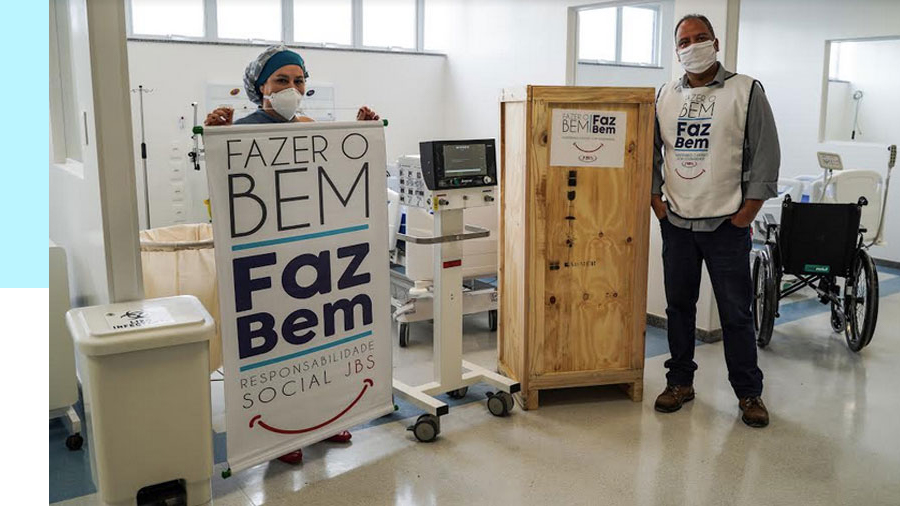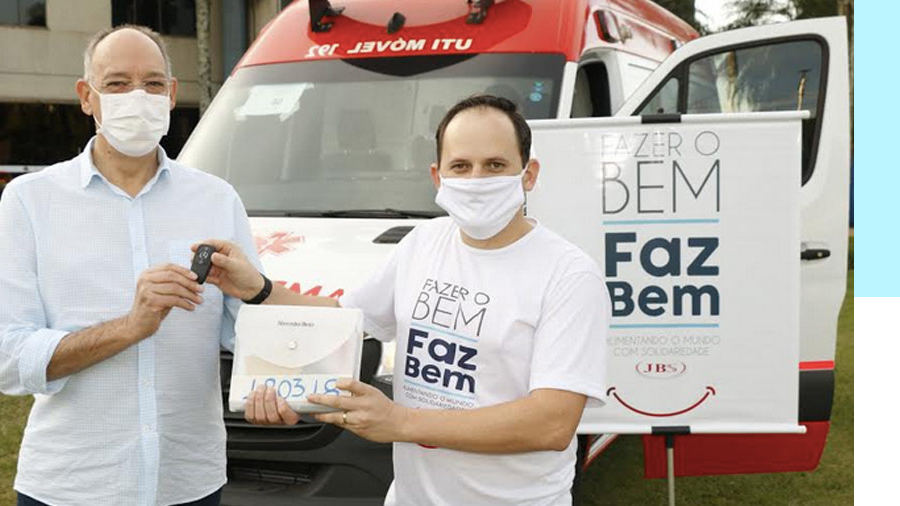Within the public health pillar, the “Fazer O Bem Faz Bem” Program included the construction of two modular hospitals, at Porto Velho (RO) and Ceilândia (DF), which were handed over in July 2020, in a partnership with the Brasil ao Cubo entity. The structures were presented to the state governments ready for use and fully equipped. The inspiration for this structure model came from the Chinese city of Wuhan, the epicenter of the pandemic, which built a 1500-bed hospital in only 10 days. Unlike field hospitals, the modular hospitals are permanent assets that will continue serving the population once the Covid-19 pandemic has ended.
In general, the lack of equipment for treating the most serious cases of coronavirus was one of the major problems faced by the states and municipalities consulted by JBS. Among the most requested items were multiparameter monitors – one of the main hospital items of equipment for life support; more than 1.600 monitors were delivered. These devices display the patient’s health condition in real time to the medical teams, enabling quick and assertive decisions to be taken about treatment. Besides the heart rate, multiparameter monitors monitor the patients’ breathing rate and saturation – the quantity of oxygen in the blood.
Another item very much in demand are infusion pumps used for administering intravenous medication such as sedatives. 1.200 infusion pumps were donated for use in ICUs, which is important because it enables the prescribed dosage to be precisely administered. The list of requests also includes secretion suction machines, clinical beds, ICU beds, defibrillators, gurneys, digital thermometers, stethoscopes, tomographs, X-ray machines, portable ultrasound equipment and electrocardiographs with trolleys.
Besides the devices, JBS also donated fully equipped infirmary ICU and clinical beds. The former consist of infusion pumps, multiparameter monitors, monitoring hubs, beds with mattresses, respirators and defibrillators. Clinical beds come with beds with mattresses, gurneys with mattresses, multiparameter monitors, electrocardiographs, cardiac arrest carts, complete with shelves for defibrillators and thermometers. The Company also provided 88 ambulances to serve the needs of various municipalities.
Personal Protection Equipment (PPE) kits were one of the main requests received by the Program - over 19.5 million PPE units to more than 200 cities in Brazil. To also respond to the public health and social emergencies, we donated hygiene and cleaning products – in all, over 1.4 million liters of these products both to needy families and hospitals.

And to assist with Covid testing in Brazil, 21 RNA extractors and 62 extraction kits were donated to the Ministry of Health and forwarded to the LACEN (the Central Public Health Laboratories) in states across the entire country. The equipment is used for Covid-19 testing, affording rapid responses in testing for the disease – each one with the capacity to process 96 samples in an hour. After the pandemic, the RNA extractors can be used to diagnose other viral diseases, leaving a legacy for the laboratories.

In line with the needs of the localities consulted, the assistance provided by JBS is not restricted to material items. The Company donated to the state of São Paulo, for example, the service of 40 pulmonary physiotherapists to attend patients in the Clinics Hospital of the University of São Paulo Medical School (FMUSP). JBS also arranged for the chartering of to transport to Brazil and medication from other countries, according to the needs of several states.
To respond to the emergency situation in the city of Manaus (AM), in January of 2021, 400 oxygen cylinders were dispatched to the municipality – the supply was the equivalent of approximately 4,000 cubic meters of oxygen, which enabled 40 patients to remain on respirators, uninterruptedly, for around 10 days. JBS shipped the full cylinders on a cargo aircraft, and picked up the empty cylinders in the Amazon capital so that they could be refilled in other states.
Also in the Northern region, the Abaré Hospital School Ship, which provides medical and dental services to more than 70 riverine, quilombola and indigenous communities in the west of Pará State, received a donation of R$ 320,000.00 to enable the vessel to be repaired and equipped to attend to 20,000 inhabitants.
Besides the donations to hospitals and medical equipment on the public health front, JBS also supported the disclosure of the initiative for free DL (distance learning) courses for various healthcare professionals, with the support of the tools provided by the Albert Einstein Hospital and the Instituto MV, by which a team provided free training to health care professionals.


